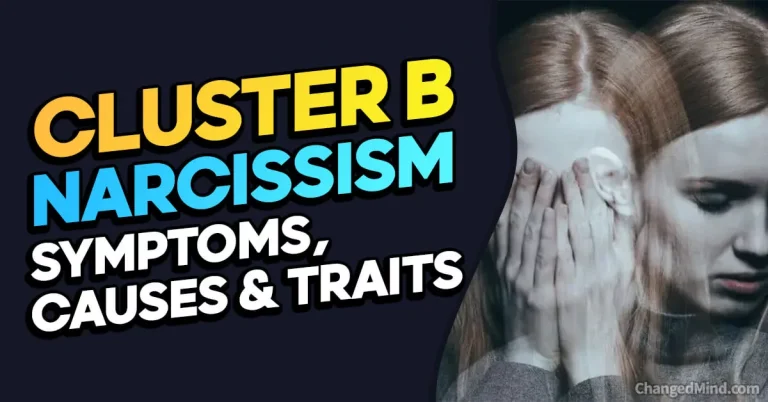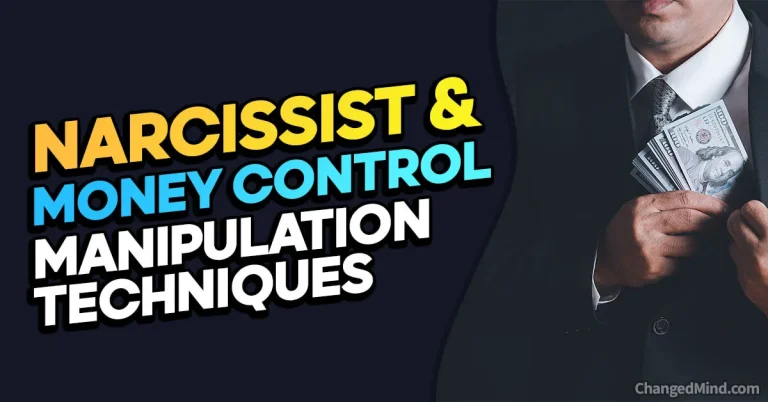Imagine dating Superman, only to find out it’s his ego wearing the cape!
Welcome to the wild world of narcissism. Now, the million-dollar question: Can A Narcissist Change? The short answer is – yes, but it’s like turning a cruise ship; it takes time and effort.
Keep reading to uncover the enthralling truth behind narcissistic transformations.
We’ll dive into therapy options, heart-melting love stories, and the role of willpower. Buckle up, because this journey is as twisty as a telenovela plot!
Narcissistic traits vs. NPD
Hold up, not everyone who’s a tad self-obsessed has Narcissistic Personality Disorder (NPD). Just like having a sweet tooth doesn’t make you a chocolate factory! Likewise, abusive or manipulative tendencies don’t always mean NPD.
NPD is like that overstaying house guest – it’s a long-haul mental health issue messing with one’s personality and thought processes. If someone’s behavior ticks off at least five of these symptoms, they might just be a card-carrying member of the NPD club:
- Swanking around like royalty
- Hungry for compliments like a snack monster
- Lost in daydreams of power, cash, beauty, or fairy-tale romance
- Believing they’re the unicorns of humanity
- Feeling entitled to their own set of golden rules
- Sporting a haughty ‘tude
- Using relationships like ATMs
- Turning green with envy
- Showing the empathy of a rock
Now, here’s a plot twist in the “Can A Narcissist Change?” saga: They can! But don’t expect a magical transformation. Treatment can take the edge off, but it’s not a cure. Plus, many NPD folks dodge therapy like it’s lava, or they put on an Oscar-worthy performance hiding their true colors.
Brief definition of narcissism
Narcissism, my dear Watson, is not just your Instagram-loving friend who can’t pass a mirror without admiring themselves. No siree. It’s like an onion – it’s got layers, and sometimes, it makes you want to cry. Narcissism is actually a personality trait which can range from someone who’s just a little full of themselves to the full-blown Narcissistic Personality Disorder (NPD) – that’s when things get really gnarly.
Importance of understanding narcissism in relationships
Picture this: You’re chilling, just living your best life, and in struts Mr. or Ms. “I’m God’s gift to humankind.” Before you know it, you’re in a relationship and everything’s about them. Conversations, decisions, Saturday nights – you name it. If you’ve ever been there, or are there right now, you know how draining this can be. Understanding narcissism is like knowing the cheat codes in a video game; it helps you navigate the maze that is your relationship. Being in a relationship with a narcissist can feel like you’re on a roller coaster that only goes down. Not fun, my friend, not fun at all.
Introduce the main question: “Can A Narcissist Change?”
Now, the million-dollar question – “Can A Narcissist Change?” And no, I don’t mean change outfits, though they probably do that a lot too. I mean, can they go from ‘me-me-me’ to maybe ‘you-sometimes’? It’s the question that keeps people stuck in relationships with narcissists for way longer than they should be. It’s like waiting for a cat to bark. But hold on, let’s not get ahead of ourselves. We’re going to dive into the science, the psychology, and give you some real-talk advice on this oh-so-thorny issue.
Expert Says
Laurie Hollman, PhD
Licensed Psychoanalyst, Choosing Therapy | Author, “Are You Living with a Narcissist?”.

So, stick around because we’re about to put on our detective hats and uncover the mystery behind narcissism and whether these selfie-loving, spotlight-stealing folks can really change.
Stay tuned, and don’t touch that dial (or, uh, mouse).
The Psychology of Narcissism

Ah, the murky waters of psychology! But fear not, intrepid explorer, for we have brought our trusty flashlight: science.
The Narcissistic Personality Disorder (NPD) Spectrum
Imagine narcissism as an ice cream flavor spectrum. On one end, you’ve got vanilla – the folks who might just love taking selfies and occasionally think the sun shines out of their rear ends. On the other end, there’s ghost pepper ice cream (yes, it’s a thing) – the hardcore Narcissistic Personality Disorder (NPD). NPD isn’t just spicy; it’s hot – the kind that makes you scream for a glass of milk.
NPD is a legitimate psychological disorder, and according to the DSM-5 (that’s the Diagnostic and Statistical Manual of Mental Disorders, not a cool band name), around 1% of the population has it. But here’s the kicker: a study by the National Institutes of Health says that 6% of people will have it at some point in their lives. Now, that’s a lot of ghost pepper ice cream!
Common Traits of Narcissists
So, what makes a narcissist a narcissist? Let’s break down the Greatest Hits:
- Grandiosity: They’re not just good; they’re the best. Think Kanye West during an acceptance speech.
- Fantasies of Unlimited Success: They’re going to be billionaires, with a private island, obviously.
- Belief of Being Special or Unique: Like unicorns, but less cute.
- Need for Excessive Admiration: Clap for them, tell them they’re amazing, rinse, repeat.
- Sense of Entitlement: The world owes them, big time.
- Interpersonally Exploitative: They’ll use others like a BOGO coupon.
- Lack of Empathy: Emotions? What are those?
- Envy of Others or Belief That Others Are Envy of Them: The grass is greener where they are, and everyone must want a piece.
- Arrogance: Their middle name, basically.
Causes and Development of Narcissism
Now, where does narcissism come from? Is it like a prize in a cereal box or something you catch, like a cold? Let’s delve into it.
First, there’s the genetic lottery. Like the color of your eyes, narcissism can be something you’re born with. It’s in the genes, baby.
Next, we have environmental factors. This is where parenting comes in. Imagine a kid being treated like royalty or, conversely, being told they are never good enough. Both scenarios can create a narcissist. Go figure!
Lastly, there’s psychology. Sometimes, the wiring in the brain is just set up in a way that makes a person more prone to narcissism. It’s like having a default setting that’s hard to tinker with.
Expert Says
Emily Simonian, LMFT
Licensed Marriage and Family Therapist, Thriveworks

So, my friend, now you know narcissism isn’t just about people loving themselves too much. It’s a complex, layered, and sometimes spicy disorder that has its roots in genetics, environment, and psychology. Armed with this knowledge, you are ready to tackle the million-dollar question, “Can A Narcissist Change?” with gusto and savvy. Onward, valiant knight!
The Scientific Perspective
Let’s get our lab coats on and dive into the scientific side of things. Yes, we’re talking charts, studies, and maybe even a microscope or two. Let’s see what science has to say about whether our friends the narcissists can change. “Can A Narcissist Change?”, the saga continues!
Overview of Research on Narcissistic Change
Get this, Sherlock: research has been playing cat and mouse with the answer. In one corner, we have studies like the one from the Journal of Research in Personality (2019), which showed that narcissism can decrease over time, especially the ‘vanilla’ type we talked about. People do mature after all, don’t they?
But wait, there’s more! On the other side of the boxing ring, we have the NPD heavyweights. Studies have shown that the ghost pepper narcissists, those with NPD, don’t have an easy time changing. It’s like trying to turn a cruise ship on a dime. Possible? Maybe. Easy? Definitely not.
Cognitive and Emotional Limitations of Narcissists
Alright, let’s talk about the brain-gymnastics that narcissists are not so good at.
First up, empathy. For most people, empathy is like breathing. For narcissists, it’s more like trying to solve a Rubik’s Cube while blindfolded. They have a tough time putting themselves in other people’s shoes, mainly because they’re too enamored with their own designer boots.
Next, insight. A key ingredient for change is knowing that you need to change (mind-blowing, right?). The problem is, narcissists often don’t believe there’s anything wrong with them. It’s like they’re looking into a funhouse mirror that only shows their best angles.
Insights from Neuroscience
Hold on to your neurons, because now we’re talking brain science! The wonder that is neuroscience has given us some pretty cool insights into the narcissistic brain.
One study from the Journal of Psychiatric Research showed that people with NPD have abnormalities in the area of their brain related to – you guessed it – empathy, and understanding other people’s perspectives. Their brains are literally wired differently.
But before you go throwing in the towel, another study suggests that with the right kind of therapy, there might be a chance for neuroplasticity – that’s a fancy word for the brain’s ability to change. Imagine giving the brain a good workout so it can flex those empathy muscles it never knew it had.
Now you’re a bit wiser and even a quasi-neuroscientist. We’re not saying that you should go operate on brains, but at least now you know what’s going on in there.
In the next part of this epic “Can A Narcissist Change?” adventure, we’ll look at what change means for a narcissist and what it might take for them to switch gears. Keep your lab coat on, we’re just getting started!
Can A Narcissist Change?
Alright, fellow truth-seekers, we have reached the climax of our thrilling journey. Can a Narcissist change? Let’s roll up our sleeves and dissect this riddle like a frog in high school biology class. Don’t worry, it’s less slimy.
What Does Change Mean for a Narcissist?
Picture your favorite TV series. Now imagine one of the characters undergoing a drastic transformation from season 1 to season 7 (lookin’ at you, Game of Thrones). For a narcissist, change is kinda like that, except more complex and less dragon-filled.
Changing for a narcissist isn’t just about not being a jerk. It’s a deep and multifaceted shift. It might involve developing empathy, letting go of grandiosity, and maybe even – gasp – admitting they are wrong sometimes. I know, it’s wild.
The Role of Therapy and Professional Intervention
1. Cognitive Behavioral Therapy (CBT)
Remember how we talked about the brain’s gymnastics earlier? CBT is like hiring an Olympic coach for the mind. It helps narcissists challenge their unhealthy beliefs and replace them with more balanced ones. It’s like swapping out their distorted funhouse mirror for one that shows the full, unfiltered picture.
2. Dialectical Behavior Therapy (DBT)
DBT is CBT’s hip cousin. It focuses on accepting uncomfortable thoughts and developing emotional regulation. For narcissists, it’s like learning how to sit with the feeling that they’re not the center of the universe without having a meltdown.
The Role of Self-Awareness
Here’s a twist: narcissists need to be aware that they are narcissists. Mind-blowing, right? Realizing that their actions have consequences and that other humans have feelings too is a big step. It’s like that ‘aha’ moment when you finally understand why everyone was raving about the ending of Inception.
External Factors That May Facilitate Change
1. Relationships and Social Support
Sometimes, a little love goes a long way. Positive relationships can be a turning point for narcissists. It’s like having a good friend who tells you there’s spinach in your teeth. Sometimes narcissists need someone to point out the metaphorical spinach in their personalities.
2. Life Events (e.g. parenthood, career changes)
Life has a funny way of throwing curveballs. For narcissists, events like becoming a parent or experiencing career changes can be a wake-up call. It’s like life shouting, “Hey, this is your chance to grow!”
Limitations to Change and Realistic Expectations
But let’s hit the brakes for a second. Changing is hard, and for the ghost pepper narcissists, it’s even harder. It’s important to keep expectations realistic. They might not become Mother Teresa, but maybe they’ll start saying “thank you” to the barista. Baby steps, folks.
Also, not every narcissist will be willing to change. It’s like trying to make a cat take a bath; sometimes it just ain’t happening.
So, can a narcissist change? The answer is like a well-made martini: complex and with a twist. With the right ingredients – therapy, self-awareness, and a dash of life experience – it’s possible. But don’t expect miracles; change is a slow brew, not an instant coffee.
Now go forth with this newfound knowledge and may your conversations be ever enlightened. And next time someone asks you, “Can a narcissist change?”, you’ll be ready to take them to school!
The Role of the Non-Narcissist Partner or Friend
So you’re in the thick of it, trying to co-pilot a relationship with a narcissist. Grab your superhero cape, because we’re about to explore how you can do your part without losing your sanity. But a quick disclaimer: You’re not a wizard, Harry. You can’t cast a spell to make a narcissist change. What you can do, however, is to navigate this terrain like a champ.
Setting Boundaries
What’s a relationship without boundaries? A recipe for disaster, that’s what. Like using a toaster in the bathtub, not setting boundaries with a narcissist can be shocking in all the wrong ways.
Think of boundaries as your personal force field. You’ve gotta establish what’s okay and what’s as welcome as a skunk at a lawn party. For instance, calmly saying “I won’t tolerate being spoken to that way” is a good start. It’s not about controlling the narcissist, but controlling your own environment. It’s time to channel your inner Gandalf and say, “You shall not pass!”
Offering Support Without Enabling Behavior
This is a balancing act worthy of Cirque du Soleil. How do you support someone in their journey without becoming an enabler? Like adding cheese to a sandwich, it’s about moderation. You don’t want the cheese overpowering the sandwich and turning it into a gooey mess.
Offering words of encouragement or attending therapy together can be good. But bailing them out every time they act like a narcissistic nincompoop? Not so much. It’s important to recognize when your support is actually reinforcing their bad behavior.
When to Consider Leaving a Toxic Relationship
And now, for the hardest part: recognizing when it’s time to pack your bags and hit the road. Being involved with a narcissist can sometimes be like playing poker with a cheater. You keep hoping they’ll play fair, but sometimes the game is rigged from the start.
If the relationship is causing harm to your mental health, or if you feel like you’re sinking into the quicksand of their narcissism, it’s time to evaluate. There’s no shame in saving yourself. Remember, even Rose let go of Jack in Titanic – sometimes you need to find your own door to float on.
So dear friends, as you navigate the turbulent waters of being close to a narcissist, don’t forget your own worth. Can a narcissist change? It’s possible. But it’s equally important that in the midst of their metamorphosis, you don’t lose yourself in the process. Your wellbeing should never be the sacrificial lamb on the altar of their transformation. Tally ho!
Protecting Yourself in a Relationship with a Narcissist
Let’s switch gears and focus on you. Think of yourself as the star of your own action movie, and your mission, should you choose to accept it, is to protect yourself while navigating the treacherous waters of a relationship with a narcissist. Can a narcissist change? Maybe. But in the meantime, let’s ensure you’re not turning into an emotional pretzel. 🥨
Recognizing the Signs of a Toxic Relationship
Before you can escape the clutches of a rogue narcissist, you have to know when you’re in over your head. Picture yourself as Sherlock Holmes, pipe and all, and keep an eye out for these plot-twisting clues:
- You feel like you’re walking on eggshells. 🥚
- Your self-esteem has taken a nosedive.
- You are constantly being criticized or belittled.
- The relationship feels like an emotional roller coaster.
These signs are the equivalent of your sidekick whispering, “This is not going well!” Trust your instincts, Watson.
Building Emotional Resilience
When it comes to emotional resilience, think of yourself as a human bouncy castle (minus the kids and weird smells). You want to be able to withstand the storms without deflating.
- Talk to trusted friends – They are like the emotional pit crew of your racing car.
- Practice self-care – This is not just bubble baths. Think hobbies, exercise, and maybe a dance-off with your mirror-self.
- Learn and grow – Read, attend workshops, take courses. Equip yourself with the emotional armor of a knight, or perhaps a very sturdy potato.
Seeking Help and Resources
When dealing with a narcissist, there’s no shame in calling for backup. Think of it as summoning your emotional Avengers.
- Therapy and counseling – It’s like having Dumbledore guide you through your challenges.
- Support groups – Because sometimes it’s comforting to know you’re not the only one battling narcissistic dragons.
- Educational resources – Read books, articles, and blogs (hint hint) on narcissism and relationships.
In the end, remember that protecting yourself doesn’t mean you’re the villain. Sometimes, the bravest thing you can do in a relationship where a narcissist isn’t changing, despite your best efforts, is to save the day by saving yourself. Don the cape, cue the epic music, and remember, you’re the hero in your own story. 🦸🎵
What Should a Narcissist Do To Change?
A small 2014 study found that 53% of people with NPD were in remission 2 years later. This suggests narcissistic traits may change with time. However, this does not mean that a person will spontaneously get better, nor that they will necessarily become safer or easier to have a relationship with.
Oh, the elusive metamorphosis of a narcissist! Think of it like turning a Grinch into Santa Claus. 🎅 So, if you’re a narcissist looking to change or know one, buckle up, because this is the rollercoaster ride of personal growth.
Firstly, admit that your reflection in the mirror isn’t just for admiring. Yes, it’s hard to believe, but there’s a possibility that there’s room for improvement! 😉 Embrace self-reflection. Explore what’s behind the façade.
Next, dash into therapy like it’s a Black Friday sale. A therapist can be that friend who tells you the spinach stuck in your teeth. Honest, but needed. They’ll help in recognizing the needs and feelings of others.
Finally, practice empathy like it’s a new hobby. Collect empathy badges like they’re Pokémon cards. It’s not just about being fabulous yourself; it’s about seeing the fab in others too!
Can a Narcissist Change for Love?
Alright, let’s talk love, baby. You know, the stuff that makes the world go round? The fuel to the flames of passion? The peanut butter to your jelly? The question at hand is: Can a narcissist change for love? We’ll navigate this tricky terrain and try to unravel the mystery that is as tangled as your earphones in your pocket.
Love can facilitate change.
Picture love as that friend who helps you move on a Sunday. It’s helpful, but, boy, it’s not going to pack your boxes for you. Love can be a facilitator for change in a narcissist. It can be like the golden carrot dangling just out of reach that makes them want to be better. Psychologists have found that the warm embrace of a loving relationship can sometimes soften the hard edges of a narcissist. But hold your horses, it’s not that simple.
Change must start from within.
Real talk – change is an inside job. Like the journey to Mordor, it’s an arduous trek that must be taken willingly. If a narcissist is changing just to appease someone, that’s like painting over a moldy wall and calling it renovated. Genuine change needs a deeper foundation than just external influence; it’s got to come from the very core of their being.
Personal Responsibility Is a Must
Ah, responsibility, the spinach in the teeth of many a narcissist. They need to acknowledge their shortcomings and own up to their behavior. It’s like having an overgrown garden; you can’t just wish it to be tidy. You need to roll up your sleeves and get to pruning. For the narcissist, taking personal responsibility is the weed whacker they need in their emotional toolkit.
Don’t Forget to Focus on Yourself
Now, if you’re the partner here, don’t forget about numero uno – that’s you, by the way. Supporting a narcissist who is trying to change is like trying to solve a Rubik’s cube while juggling – it takes focus and balance. Remember to maintain your own garden. Seek therapy, engage in hobbies, and surround yourself with supportive friends.
Remember, “Can a narcissist change for love?” is a loaded question. The answer is more convoluted than the plot of a telenovela. Love can be a powerful motivator, but the narcissist must be ready to take the wheel and steer their ship towards change.
So, dear readers, buckle up, keep your own wellbeing in check, and remember that change is a two-player game. And always, always, remember that sometimes love is necessary but not sufficient on its own. 🌹💔
If you’re involved with someone who has narcissistic tendencies, don’t hesitate to seek professional advice.
Can a Narcissist Change in a New Relationship?
New relationships are like shiny new toys to narcissists. They may be on their best behavior in the honeymoon phase. But here’s the deal: it’s one thing to put on a new suit; it’s another to change the person inside it.
Can a narcissist change in a new relationship? They might. A new relationship can be a wake-up call – but it’s not a magic spell. The key is consistent effort and genuine desire to change for the better, not just to impress someone.
How to Help a Narcissist Change?
If you’re ambitious enough to take on the Herculean task of helping a narcissist change, be sure to wear your emotional armor!
- Boundaries, boundaries, boundaries! It’s the real estate of relationships.
- Encourage therapy. Gently push them towards professional help. Remember, you’re not their psychologist.
- Be supportive, but don’t enable. It’s like watering a plant; give it what it needs but don’t drown it.
In essence, if you’re dealing with a narcissist who wants to change or want to help one, know that it’s not an easy path. It’s a bit like trying to win an Olympic gold medal in emotional gymnastics. 🤸 But with the right tools, support, and a sprinkle of determination, strides can be made!
Note: If you or someone you know is dealing with mental health issues, it’s important to seek professional help.
Conclusion
So, brave reader, we have journeyed through the dense jungles of narcissism together. It’s time to break out the compass and see where we’ve landed. Can a narcissist change? Well, let’s recap.
Summarize the Complexities Involved in Narcissistic Change
As we’ve seen, changing the narcissist is a bit like teaching a cat to fetch – technically possible, but don’t hold your breath. It’s a complex tangle of psychology, neuroscience, therapy, and a dash of real-life magic. The narcissist must be willing to swap the scepter for self-awareness, and even then, it’s an uphill battle.
Encouragement for Those Dealing with Narcissistic Relationships
If you’re locked in a tango with a narcissist, here’s a big virtual hug. 💙 You, my friend, are a modern-day warrior. Remember, your emotional armor is vital. Keep that helmet of self-esteem on tight, and don’t forget your trusty sword of boundaries. It’s also okay to call in the cavalry (therapy, support groups, etc.) if you need it. There’s strength in numbers!
Share Your Experiences and Thoughts in the Comments Section
Before we part ways, let’s gather around the virtual campfire. 🔥 We want to hear from you. Have you tried to teach a narcissist new tricks? Did it work or were you left holding a bag of doggy treats? Share your epic tales, thoughtful insights, and occasional facepalms in the comments section below. Let’s build a tribe of wisdom and support.
And so, with our armor a little battered but spirits undeterred, we reach the end of our quest. May your path be filled with growth, empowerment, and the occasional well-placed catapult. 🏹 Until next time, fellow adventurers!
Please remember, this is the digital scroll of wisdom, but in a dire situation, do not hesitate to seek professional help. 📜✨
FAQ
What are the signs that a narcissist is making genuine changes?
When a narcissist is making genuine changes, you may notice increased self-awareness, empathy, and accountability. They might start acknowledging others’ feelings and show a willingness to compromise, rather than being overly self-centered and manipulative.
Can therapy help a narcissist to change?
Yes, therapy can be effective in helping a narcissist change. Cognitive Behavioral Therapy (CBT) and Dialectical Behavior Therapy (DBT) are particularly helpful in addressing underlying issues, improving emotional regulation, and fostering healthier relationship dynamics.
Is it common for a narcissist to change?
It’s not very common for a narcissist to change as it requires a significant amount of self-reflection and effort. However, with the right therapy, support, and personal motivation, some individuals with narcissistic traits can make positive changes.
How long does it take for a narcissist to change?
The time it takes for a narcissist to change varies from person to person. It’s a gradual process and can take months or even years of consistent therapy and personal commitment. Patience and realistic expectations are key.
Can a relationship make a narcissist change?
While a supportive relationship can be a motivating factor, it alone cannot make a narcissist change. True change must come from within the individual. It’s also important for partners to set boundaries and not enable unhealthy behaviors.






